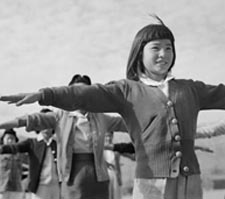
CORE COURSES
2014-2015 Course Offerings
For additional information on the American Studies courses, please contact our academic advisor, Dr. Rachel Gordan, at: csus.advisor@utoronto.ca.
Fall 2014
USA 200H1F: Introduction to American Studies, Emily Truman, Thursdays 1:00-3:00pm, enrollment cap: 45
Students in this course will examine the politics, history, and culture of the United States through a selection of "keywords" from the field of American Studies (i.e. nation, frontier, race, gender, memorials, etc.). Through a critical analysis of primary readings from American Studies scholars, as well as other academic and contemporary writing, we will interrogate and problematize the keywords in question. A central focus of our analysis will be the social, cultural, and political contexts surrounding our keywords, as well as their representation in mediated texts. The instructor will also provide a material "object of the week," which functions as a fun and engaging entry point into the issues and debates related to the week's topic. The object and its significance will be discussed and debated by the students in conjunction with the instructor.
USA 310H1F: Approaches to American Studies: Life and Death in the American Health Care System, Caitlin Henry, Tuesdays 10:00am-12:00pm, enrollment cap: 45
With the Affordable Care Act (or Obamacare), health care in the U.S. is entering a new phase. While millions of people will now be able to better access health care services, the ACA has brought to light issues of politics, religion, discrimination, and inequality in the U.S. Perhaps most importantly, these debates have shown how health care in America is in the midst of a political, economic, and financial crisis. In this class, we will investigate the history and key issues of health care in the U.S. We will ask: Why does the U.S., unlike every other Western nation, not have national health care? Why do conservatives cry socialism at the mention of the Affordable Care Act? How did the massive for-profit health care industry develop? Why, in one of the wealthiest and most powerful countries in the world, do millions of people lack access to basic health care services? What does the health care system reveal about politics, government, and inequality in the U.S.?
USA 400H1F: Topics in American Studies: Inequality in America, Peter Loewen, Tuesdays 12:00pm-2:00pm, enrollment cap: 22
Inequality in America has reached levels not seen since the 1920s. What are the causes of this inequality, and what are the consequences? This course will examine the sources and effects of inequality through work from political science, economics, literature, and history. The first part of the course will consider the history of political and economic inequality in America. The second part of the course will track the increase in inequality over the last three decades. The third part will consider the economic, political, and social consequences of this inequality.
USA 401H1F: Topics in American Studies: Jews and Religion in America, Rachel Gordan, Wednesdays 6:00pm-8:00pm, enrollment cap: 22
It could be argued that Jews have been the most important non-Christian religious group in America. Since their arrival in New Amsterdam in 1654, Jews constituted the religious "other" that helped to forge and test American notions of religious tolerance. In many ways, Jews are a useful group to "think with," when it comes to religious pluralism in America. In this course, we will examine the way Jews have interacted with and informed ideas about religion in America, focusing on three ideas central to that history: 1) the separation of church and state; 2) the idea of a "Christian America"; and 3) liberalism in American politics and thought. To this end, the seminar readings will consist of scholarly work on American Jewish history and primary sources.
Spring 2015
USA 300H1S: Theories and Methods, Instructor TBD, Tuesdays 12:00pm-2:00pm, enrollment cap: 60
This course, required for majors and minors but open to all who have met the pre-requisites, explores a range of approaches to the field of American Studies. Students will be introduced to some of the many ‘theories and methods’ that have animated the field of American Studies, including historical methods; formal analysis of visual and literary texts; and key concepts, such as commodity chain analysis; ‘race,’ ‘commodity,’ ‘gender,’ ‘diaspora’, and ‘affect.’
USA 311H1S: Approaches to American Studies: Hellhound on my Trail: Living the Blues in the Mississippi Delta, 1890-1945, Anastasia Jones, Mondays 6:00pm-8:00pm, enrollment cap: 22
This course examines black life and culture in the cotton South through the medium of recorded blues music. It seeks to restore a voice and a sense of agency to black southerners in the age of Jim Crow. Topics include the plantation economy, agricultural life, mobility, migration, and urban subcultures.
USA 402H1S: Topics in American Studies: Taking Shots at the Man: Assassination and the American Presidency, Instructor TBD, Wednesdays 6:00pm-8:00pm, enrollment cap: 11
This seminar focuses on political violence directed at the U.S. President from the Civil War to the War on Terror. At key historical moments of national crisis, the office of the Presidency has repeatedly become a target of assassination. While much can be learned by investigating the grievances articulated by assassins, interpretations of their explanations shifted considerably as their acts reverberated through American culture. Public debates surrounding these acts of violence have been framed by historically-specific notions of race, class, gender, and mental fitness. In this course, we will cover several assassination attempts from 1865 to2001 through interwoven themes of power and memory. As an advanced topics seminar, students will be required to pursue original research on a topic of their choice, and write a 20-page research paper.
USA 403H1S: Topics in American Studies: U.S. Wars in Asia, Instructor Lisa Yoneyama, Thursdays 2:00pm-4:00pm, enrollment cap: 5
This course examines the cultural and social legacies of the 19th and 20th centuries’ hot and cold wars, fought by the U.S. and Canada in different parts of Asia. It explores film, literature, and other cultural products that came out of the transpacific violence and its aftermath.








